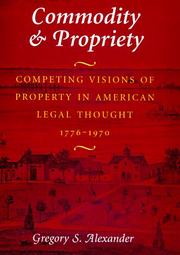| Listing 1 - 2 of 2 |
Sort by
|
Book
Year: 2011 Publisher: Chicago, IL : University of Chicago Press,
Abstract | Keywords | Export | Availability | Bookmark
 Loading...
Loading...Choose an application
- Reference Manager
- EndNote
- RefWorks (Direct export to RefWorks)
Since the dawn of the republic, faith in social equality, religious freedom, and the right to engage in civic activism have constituted our national creed. In this bracing history, Kathleen D. McCarthy traces the evolution of these ideals, exploring the impact of philanthropy and volunteerism on America from 1700 to 1865. What results is a vital reevaluation of public life during the pivotal decades leading up to the Civil War.The market revolution, participatory democracy, and voluntary associations have all been closely linked since the birth of the United States. American Cr
Charities -- United States -- History -- 18th century. --- Charities - United States - History - 18th century. --- Charities -- United States -- History -- 19th century. --- Civil society -- United States -- History -- 18th century. --- Civil society - United States - History - 18th century. --- Civil society -- United States -- History -- 19th century. --- Nonprofit organizations -- United States -- History -- 18th century. --- Nonprofit organizations - United States - History - 18th century. --- Nonprofit organizations -- United States -- History --19th century.

ISBN: 1299104487 0226013529 9780226013527 0226013537 0226013545 9780226013541 9780226013534 0226013537 0226013545 Year: 1997 Publisher: Chicago : University of Chicago Press,
Abstract | Keywords | Export | Availability | Bookmark
 Loading...
Loading...Choose an application
- Reference Manager
- EndNote
- RefWorks (Direct export to RefWorks)
Most people understand property as something that is owned, a means of creating individual wealth. But in Commodity and Propriety, the first full-length history of the meaning of property, Gregory Alexander uncovers in American legal writing a competing vision of property that has existed alongside the traditional conception. Property, Alexander argues, has also been understood as proprietary, a mechanism for creating and maintaining a properly ordered society. This view of property has even operated in periods-such as the second half of the nineteenth century-when market forces seemed to dominate social and legal relationships. In demonstrating how the understanding of property as a private basis for the public good has competed with the better-known market-oriented conception, Alexander radically rewrites the history of property, with significant implications for current political debates and recent Supreme Court decisions.
Property --- Civil society --- Social contract --- Economics --- Possession (Law) --- Things (Law) --- Wealth --- Social aspects --- History. --- Law and legislation --- Social aspects&delete& --- History --- E-books --- United States --- Property - Social aspects - United States - History. --- Civil society - United States - History. --- Primitive property --- property, rights, america, american, united states, usa, history, historical, legal, litigation, law, lawyer, 1700s, 1800s, 1900s, 20th century, scholarly, scholarship, analysis, overview, student, college, university, higher ed, textbook, ownership, proprietary, market, economy, wealth, supreme court, case, judge, jury, civic, definition, thomas jefferson, commercial, republican, era, time period, politics, political, debate.
| Listing 1 - 2 of 2 |
Sort by
|

 Search
Search Feedback
Feedback About UniCat
About UniCat  Help
Help News
News